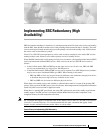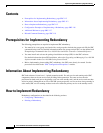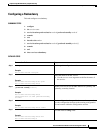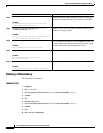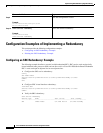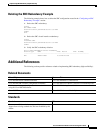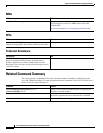
Implementing SBC Redundancy (High Availability)
How to Implement Redundancy
SBC-113
Cisco IOS XR Session Border Controller Configuration Guide
Configuring a Redundancy
This task configures a redundancy.
SUMMARY STEPS
1. configure
2. sbc service-name
3. service-location preferred-active node-id preferred-standby node-id
4. commit
5. exit
6. interface sbcnumber
7. service-location preferred-active node-id [preferred-standby node-id]
8. commit
9. end
10. show services redundancy
DETAILED STEPS
Command or Action Purpose
Step 1
configure
Example:
RP/0/0/CPU0:router# configure
Enables global configuration mode.
Step 2
sbc service-name
Example:
RP/0/0/CPU0:router(config)# sbc mysbc
RP/0/0/CPU0:router(config-sbc)#
Enters the mode of an SBC service.
• Use the service-name argument to define the name of
the service.
Step 3
service-location preferred-active node-id
[preferred standby node-id]
Example:
RP/0/0/CPU0:router(config-sbc)#
preferred-active 0/2/CPU0 preferred-standby
0/4/CPU0
Enables a service card to run SBC function as a primary, and
optionally, secondary location.
Step 4
commit
Example:
RP/0/0/CPU0:router(config-sbc)# commit
Saves configuration changes. Use the commit command to
save the configuration changes to the running configuration
file and remain within the configuration session.
Step 5
exit
Example:
RP/0/0/CPU0:router(config-sbc)# exit
RP/0/0/CPU0:router(config)#
Exits sbc mode to config mode.



